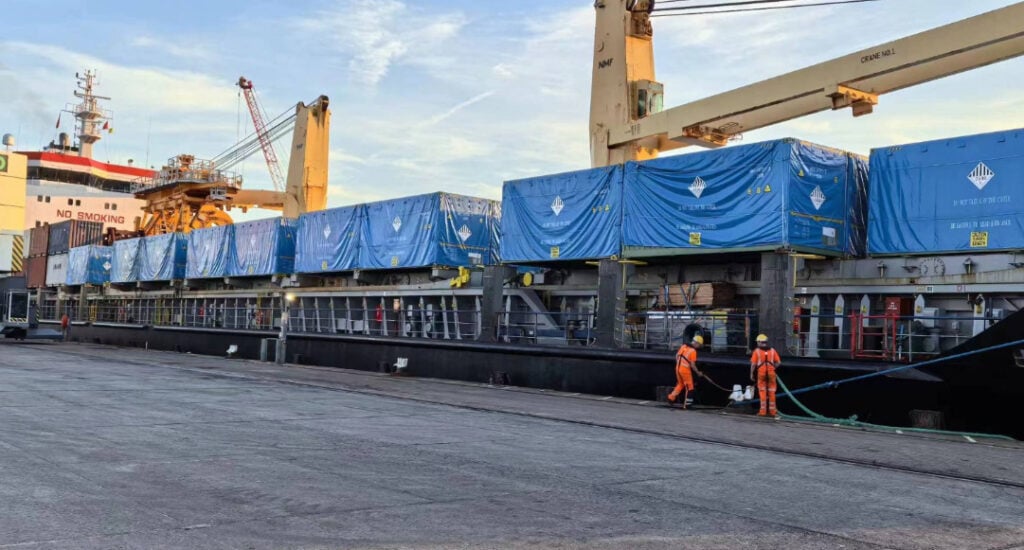
We hear from battery energy storage system (BESS) investor BW ESS about its recent seven-year toll deal in the UK, the longest seen yet in the market.
BW ESS recently agreed a seven-year tolling deal with Shell for the 100MW/330MWh ‘Bramley’ BESS in the UK, whereby Shell will pay it a fixed fee for the right to control and monetise the unit once operational in Q4 this year.
Enjoy 12 months of exclusive analysis
- Regular insight and analysis of the industry’s biggest developments
- In-depth interviews with the industry’s leading figures
- Annual digital subscription to the PV Tech Power journal
- Discounts on Solar Media’s portfolio of events, in-person and virtual
The deal is significantly different to Gresham House and Octopus Energy’s recent shorter, two-year toll deal for a 568MW portfolio of 14 already-operational BESS projects. That was the first seen in the UK, while tolling agreements are common in the US and Australia.
In response to questions from Energy-Storage.news, BW ESS’s Roberto Jimenez, executive director for BW ESS, indicated that the seven-year BESS toll entails a fixed price for the entirety of it (presumably inflation-adjusted). He wouldn’t disclose how the figure was arrived at, considering the volatility of BESS revenues in the last three years, which makes seven years a very long time to agree a price on.
Jimenez pointed out that tolls are common in other infrastructure and related classes like solar and wind and said the deal is really about optimising the project’s financing. The project is also longer in duration—at 3.3 hours—than most other UK projects being built, and this played into the deal.
“Bramley agreed on a seven-year tenor because it optimised the project’s economic returns and is a tenor that is conducive for attractive long-term financing,” he said.
“The 3.3-hour duration of the Bramley BESS asset makes it attractive to traders/optimisers that expect to capture more value from arbitrages in the wholesale energy market. The choice of duration was also driven by technical considerations and a 15-year capacity market contract for 2.5 hours duration, which was secured for the project earlier this year.”
“There seems to be an increasing preference for longer duration assets, especially for longer-term deals, where assets need to be resilient in an evolving market.”
Market intelligence provider Modo Energy estimated in an analysis article that the toll price is most likely in the range of £70,000-80,000 (US$90,000-102,000) per MW. This was based on an estimated capex for the Bramley BESS project of £900,000 per MW and the revenues needed to achieve an unlevered IRR of 10% over the project’s lifetime (£108,000 per MW), balanced with the likely ‘spread’ or profit that Shell would want to make on trading the BESS.
Wider move to BESS toll deals could leave smaller optimisers at a disadvantage
Deals like Gresham House’s and BW ESS’ are part of a wider move in the UK and European industry to structures that enable financing for the largest-scale projects.
BW ESS said that tolls will be one of various structures that asset owners will go for, but that uncontracted merchant models and hybrid structures which leave some merchant exposure will have a place.
He indicated that for its two other large UK projects, Hams Hall at 400MW and Berkswell at 200MW, the company may retain some merchant exposure with those projects still uncontracted. Both are expected to come online in 2026.
Energy-Storage.news then asked Jimenez if there was room for smaller optimisation providers to provide tolls or whether it would be dominated by big utilities and energy companies, as the two large announced deals have been (Octopus and Shell).
“Optimisers could also offer toll agreements, but those may be perceived as less attractive as they do not provide the same ability to optimise a project’s cost of capital,” he said.
Others speaking off-record have put it more bluntly. A finance source recently said during a panel discussion that the best-performing BESS optimisers tend to be small, startup-type outfits that outperform large utilities and energy companies.
But asset-owners that contract with those larger entities are ‘effectively renting their balance sheet’ to get financing, they said. In other words, banks will be more willing to lend to a project optimised by a big entity with a deep balance sheet, even if its record of BESS returns is worse, because of the lower risk compared to an asset-light startup. The longer the length of the agreement, the more the risk element will come into the equation.

